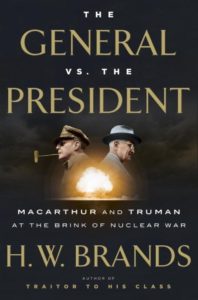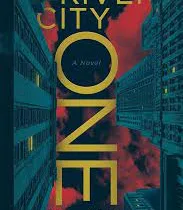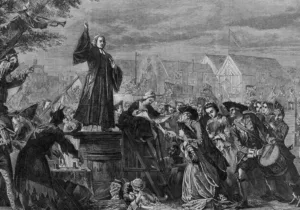The Korean War’s outbreak in 1950 was a watershed in world history. It was the first large armed conflict of the Cold War, the first war fought under a United Nations banner, and the severest test yet for the new U.S. post-World War II national security structure.
North Korea invaded South Korea on June 25, 1950, causing the United Nations to make a commitment to the security of South Korea. A U.N. Command was set up under the overall direction of the United States, through President Harry Truman in Washington and Gen eral Douglas MacArthur in Tokyo. U.S. troops went to Korea and were later joined by other nations under the United Nations banner.
eral Douglas MacArthur in Tokyo. U.S. troops went to Korea and were later joined by other nations under the United Nations banner.
The North Koreans won a series of victories that nearly pushed Korean and U.N. forces off the peninsula altogether. MacArthur’s dramatic invasion at Inchon on September 15, 1950 turned the tide and by early October had reversed all North Korean gains. The United Nations authorized an attempt to unify Korea, and MacArthur led his forces north. This advance caused Communist China to intervene in the war in November, and MacArthur’s forces were forced to retreat to the vicinity of the prewar North Korea-South Korea border.
In response, Truman stated to the press that use of the atomic bomb was under consideration. This news alarmed many allies, as they were committed only to defend South Korea and not wage a nuclear war. In Tokyo, MacArthur agitated for a showdown with Communism. These debates raged as the battle lines swayed back and forth near Seoul, and became public in March; a fed-up Truman relieved General MacArthur on April 11, 1951.
MacArthur came home to a hero’s welcome. After addressing a joint session of Congress, he and the Joint Chiefs appeared in hearings about the war to discuss the situation. In the end, MacArthur and his family moved into New York’s Waldorf Towers and retirement.
The events of 1950 and 1951 resonate today. Truman’s relief of MacArthur has defined military-civilian relationships in the decades since. The Korean War remains technically still ongoing, having ended in an armistice but without a peace treaty. U.S. troops are still in South Korea, and General MacArthur is hailed in that country as a hero.
The participants, the story of these debates, and General MacArthur’s ultimate relief, is what H.W. Brands takes up as the subject of his latest book. Readers familiar with Brands’ other works will recognize his style: brisk prose that tells an engaging story while using many quotes from the participants themselves. He brings the story to life, and highlights political aspects not often appreciated, including the role of NATO and Britain in influencing Truman’s thinking.
All that said, the book does have several limitations. Brands sometimes lapses into the hyperbolic in his prose. His use of unpublished sources, or published sources beyond widely-available ones, appears to be limited. In at least two cases, he relies on unreliable (and partially-discredited) sources about General MacArthur. While he expertly discusses the perspectives of Truman and his advisors, Brands appears to be weaker about the perspectives of MacArthur and his team in Tokyo. As an example, he fails to fully discuss MacArthur’s unusual command roles (ruler of Japan, U.N. Commander, U.S. Commander in the Far East), his seniority over his nominal bosses the Joint Chiefs, and the influence of these factors on MacArthur’s views and actions.
Christian readers will find a brief discussion of General MacArthur’s views on religion in Japan and periodic references to the views and values of various participants. A sub-theme running through the book (and the events) is the perceived clash of cultures – the values of the West and its allies versus godless Communism.
In the end, Brands has written an excellent synthesis of the Truman-MacArthur controversy. However, while it is broad it is not as deep as some other studies, most notably Michael Pearlman’s Truman and MacArthur. For a reader looking for something beyond the basics, Pearlman’s book is recommended.
—
The General Vs. The President: MacArthur and Truman at the Brink of Nuclear War. by H.W. Brands. (New York: Doubleday 2016). Photographs, maps, notes, bibliography, index. Hardcover. 448pp.
—
Christopher L. Kolakowski is a historian in Norfolk, Virginia, USA. He is the author of four books on the American Civil War and World War II, and is working on a study of the 1944 India-Burma campaigns. The views contained herein are his own.






 Live in the DC area? Sign-up for Providence's in-person events list!
Live in the DC area? Sign-up for Providence's in-person events list!